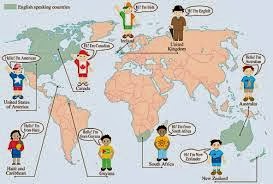THE HISYORY OF ENGLISH 10
This is the last episode of the History of English in ten minutes. It deals with the future of English and the many hybrids that have been created. Should we still call it English?
In the 1500 years since the Roman’s left Britain, English has shown an unique ability to absorb, evolve, invade and, if we’re honest, steal. After foreign settlers got it started, it grew into a fully-fledged language all of its own, before leaving home and travelling the world, first via the high seas, then via the high speed broadband connection, pilfering words from over 350 languages and establishing itself as a global institution. All this despite a written alphabet that bears no correlation to how it sounds and a system of spelling that even Dan Brown couldn’t decipher.
Right now around 1.5 billion people now speak English. Of these about a quarter are native speakers, a quarter speak it as their second language, and half are able to ask for directions to a swimming pool.
Modern hybrids of English have really caught on. There’s Hinglish – which is Hindi-English, Chinglish – which is Chinese-English and Singlish – which is Singaporean English – and not that bit when they speak in musicals.
So in conclusion, the language has got so little to do with England these days it may well be time to stop calling it ‘English’. But if someone does think up a new name for it, it should probably be in Chinese.
Right now around 1.5 billion people now speak English. Of these about a quarter are native speakers, a quarter speak it as their second language, and half are able to ask for directions to a swimming pool.
Modern hybrids of English have really caught on. There’s Hinglish – which is Hindi-English, Chinglish – which is Chinese-English and Singlish – which is Singaporean English – and not that bit when they speak in musicals.
So in conclusion, the language has got so little to do with England these days it may well be time to stop calling it ‘English’. But if someone does think up a new name for it, it should probably be in Chinese.


Comentarios